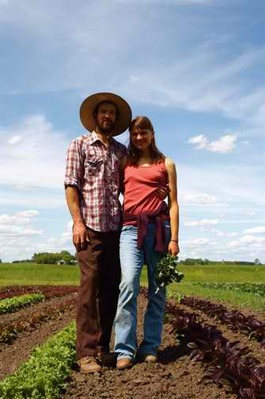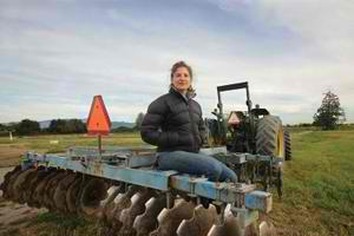
INTRODUCTION
A farm incubator trains people how to farm ecologically and subsidizes their start-up costs with the primary intent of generating new farmers.
The biggest risk in starting a farm is taking that financial leap of faith. Even if someone can afford to buy land, they have a huge learning curve in developing best farming practices. In a 2011 survey of 1,000 US farmers by the National Young Farmers' Coalition, "access to capital, access to land and health insurance present the largest obstacles for beginning farmers." A farm incubator addresses these concerns and starts to build the infrastructure necessary to educate and support new farmers.
With less than 1% of the population farming and 70% of today’s farmers about to retire, the United States is in desperate need of more farmers; farmers who can keep land in agricultural production and if necessary, rehabilitate the land away from conventional farming through regenerative, organic, farming practices.
Land-grant universities have an opportunity to open up the next green, job market by helping put people back to work as farmers and in the process create economic prosperity and healthy food for their community.
A farm incubator program is the agricultural degree for the 21st Century. A traditional agriculture degree leaves graduates with few options in today’s job market. And to train young farmers to be conventional, mega-farm operators is not progressive or ecological. But teaching farmers to be self-reliant, small-scale farmers creates jobs, ownership and environmental responsibility. Students learn sustainable, farming techniques and how to build a business plan. Upon graduation, they are provided further training opportunities as well as access to grants and subsidized land. University X has the opportunity to be a center for creating small-scale farmers and be a model for other land-grant universities to follow.
UNIVERSITY X MODEL
University X is primed to offer its community the opportunity of a farm incubator. With Cooperative Extension for classes, College of Ag for supplemental courses and available land at the adjacent field station, the foundation is in place. Unlike many incubators, the classrooms are already built, the land is available and there is access to qualified instructors of the university. Developing a farm incubator at University X is more about coordinating resources within the existing infrastructure than having to build one from the ground up.
A farm incubator compliments and cooperates with existing and proposed research plans for University X filed labs. A farm incubator diversifies University X’s product offerings attracting students who are not targeting a 4-year degree but want more in-depth training than a community college can offer. To promote the program, an outreach campaign can be launched to area high schools in order to raise awareness for the career possibilities in agriculture and improve the perception of farming as a viable career opportunity.
A farm incubator provides University X’s development office an exciting, new fundraising opportunity and a “fresh” way to engage potential and current donors. The farm incubator will generate revenue from the tuition and fees collected but capital will still need to be raised over the life of the incubator in order to purchase equipment and supplies. Donors will be attracted by the innovative approach of the farm incubator. It enriches a donors gift by being able to do more than just support education but also support the environment as well as social and economic stimulus to the community….with more people farming, more people have jobs; local food production increases; and money stays local fostering a more resilient and equitable economy.
All told, a farmer incubator is a good story and PR opportunity for the university. A farm incubator is an inspiring demonstration for modern education and an admirable way for the university to help increase city x’s food security by fostering new farmers.

A farm incubator is a revenue generating, academic opportunity. It is an alternative education model and positions University X as a cutting edge land-grant university committed to supporting and preparing farmers of tomorrow.
University X, however, should consider a variety of small farmer programs to diversify their course offerings. In addition to a farm incubator program, other traditional, but innovative, models can be developed such as a 2yr small-farmer certificate program and a small farm training series. By offering three programs, University X can leverage the classes designed, teachers hired and materials required over three programs. The 2-year program and the training series would utilize a 5-acre, demonstration garden to fulfill their course work. The 5-acres would be located on the University X’s adjacent field station property and ideally right along TBD Blvd where the public would have an aesthetic view of a working farm. Below is a recap of the three “small farmer” programs that University X should consider as a way to utilize a portion of the field station:
1. 2yr small farm certificate – a certificate-based program with an emphasis on business
2. Small Farm Training Series – 6-month training program ONLY
3. Farmer Incubator Program – 6-month training program with access to subsidized land and equipment after graduation.
SAMPLE: Economies of a Farm Incubator
· 80-acres @ $600/acre for year lease = $48,000
· 12 students @ $1200/6-month course = $14,400 every six months ($28,800/year)
· 12 students @ $150 annually for continued education and marketing support
· 40 farmers paying grounds fee, irrigation & equipment rental (not including gas) = $10,000
Total = $86,800/year*
*$45,000 would pay a full-time farm incubator manager who oversees the program as well as the
5-acre, demonstration parcel.
CASE STUDY: ALBA Organics – Salinas, CA
ALBA stands for Agriculture Land Based Training Association. ALBA trains people how to farm organically and helps them get started by leasing them subsidized land from their 110 acre property. ALBA's collaborative approach provides continued field education for all its graduates. At ALBA, you start with 6-months (150 hours) of training on a sliding scale that ranges from $250-$2500. After graduation, farmers/students pay 20% the market value for their initial 1/2-acre and over time will pay 100% for up to 7 acres. Farmers work side-by-side learning from each other with continued education from ALBA's trainers. Business support is available for small entrepreneurs or farmers can sell produce to the organization's private label brand, ALBA Organics, which is sells to Whole Foods and other grocers. In addition to the lease payments, ALBA Organics is the engine which funds the entire project first paying their growers for their harvest and returning profits back into the program.
CASE STUDY: Viva Farms in association w/ WSU – Mount Vernon, WA
The Viva Farms Incubator Program was launched in June 2009 to provide new farmers affordable access to education, training and technical assistance; capital and credit; land and markets. Approximately, half of the thirty students who participated in the first year are Latino. Each completed Skagit County’s first bilingual “Sustainable Small Farming and Ranching” course and thirty-six students completed the first bilingual “Agricultural Entrepreneurship and Farm Business Planning” course. The Port of Skagit has leased Viva Farms 33 acres for an incubator farm where course graduates may sublease plots on which to launch and grow their farm businesses. Access to shared infrastructure, equipment and low-interest “educational loans” minimizes participants’ start-up costs. Core areas of support include organic production practices, marketing, sales, distribution, record keeping and liability management. The farm incubator at Viva Farms is not an end point for farmers. It is a starting point to transition them to farm ownership and secure long-term tenure. Once farmers establish stable agricultural enterprises at the incubator, Viva Farms will help them relocate to new land and continue growing their operations. They will need capital to acquire land, equipment, seeds, livestock and other farm inputs so Viva Farm established the New Farmer Reserve Fund along with Slow Money NW and a local credit union. The fund acts as a microloan program to provide affordable start-up and growth capital to new farmers.

 RSS Feed
RSS Feed
